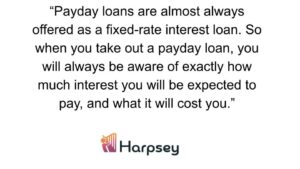Payday loans are fixed-rate loans. The definition of a fixed-rate loan is that the repayment rate remains constant throughout the term of the loan. The benefit of this type of loan is that it is easy to calculate how much you must pay in interest at the beginning of the loan.
Personal loan debt in the U.S. has increased by 18.3% from 2021 to 2022, reaching $516.5 billion in 2022. However, awareness of predatory lending practices remains low due to the lack of education about loans, including terminology such as ‘variable rate’ and ‘fixed rate’.
This article aims to explain the two terms as well as explaining which category payday loans fall into.
What Is The Difference Between A Fixed And A Variable Loan?
The key difference between a fixed and a variable loan is the interest rate. This is explained further below:
Fixed
A fixed-rate loan is where the interest is set at the beginning of the loan. There is no option to increase or decrease the rate. This means it is easy to plan your finances because you know exactly what you are paying each month. There will be no variation in how much you pay, regardless of what is occurring with the market.
A fixed-rate student loan is generally more advisable because of the certainty of knowing how much is owed, and therefore how long it will take for the loan to be entirely repaid.
Variable
A variable-rate loan is where the interest rate can change during the term of repayment according to a number of factors. Variable-rate loans are generally chosen by those who believe that interest rates will decline. On average, variable-rate loans do have lower interest rates than fixed-rate loans.
This is partly because of the additional risk involved in a variable-rate loan. This additional risk is based on the fact that interest rates could rise during the term of a variable-rate loan, which would increase the cost of borrowing and cause higher loan costs.
Are Payday Loans Fixed or Variable?
Payday loans are fixed-rate loans that are set up to be repaid in one lump sum when you next receive a paycheck. Because they are intended to be repaid in one payment, many payday lenders talk about interest charges in terms of a fixed fee as opposed to a rate.
As mentioned above, the advantage of payday loans being fixed-rate is that you are aware, at the beginning of the loan term, exactly how much interest you will need to pay. This will remain the same and will not change according to market fluctuations.
What Are The Advantages and Disadvantages of Fixed and Variable-Rate Loans?
There are key advantages and disadvantages to both a fixed and variable rate loan.
As mentioned above, an advantage of a fixed-rate loan is that you will be aware of exactly what you are expected to pay. This will help you with peace of mind when planning your finances. For those who value predictability in their long-term financial planning, a fixed rate loan is the sensible option.
However, there is the possibility of saving money with a variable-rate loan. This is because if you take out a variable-rate loan, interest rates may drop during the term of the loan. This would mean that your interest rates for the loan would decrease, and you would therefore save money.
Of course, a disadvantage to a variable-rate loan is that the opposite could occur. Interest rates could rise, which would make borrowing more expensive than you first thought. Variable-rate loans are therefore advantageous to those who are willing, and financially able, to take a larger risk with their finances
What Are Some Examples of Fixed Rate Loans?
Payday Loans
Payday loans are almost always offered as a fixed-rate interest loan. So when you take out a payday loan, you will always be aware of exactly how much interest you will be expected to pay, and what it will cost you. Fluctuations in the market will not affect the terms of a payday loan.
Personal Loans
For those who value long-term predictability in their loans, fixed-rate personal loans are generally the option that is chosen. These types of personal loans help lock down an affordable long-term payment on a 7-10 year loan.
What Are Some Examples of Variable Rate Loans?
Variable-Rate Mortgages
The variable, or adjustable, rate mortgage locks in an initial starting rate for a set time period, then implements a variable rate of interest.
It is important to note that some types of loan can be both variable and fixed-rate, depending on both the lender and your personal preferences. For example student loans can be fixed or variable rate, depending on the lender.
Mortgages can also be both fixed-rate and variable-rate, depending on the preference of the borrower. Choosing between them generally comes down to what you can afford, and what level of risk you are willing to take.
Can the Interest Rate on a Payday Loan Change Over Time?
No, in most cases the interest rate on a payday loan remains fixed throughout the loan term. Payday loans are typically short-term loans with a repayment period of a few weeks.
The interest rate is determined at the time of borrowing and does not fluctuate during that period. However, it’s important to review the terms and conditions of the loan agreement, as some lenders may have provisions that allow them to adjust the interest rate under certain circumstances.
Always carefully read and understand the loan agreement before proceeding. Not all loans are the same, and not every lender offers the same rates.



